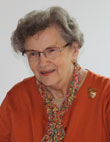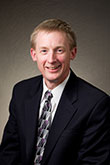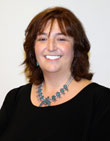
Congratulations to the 2009 Distinguished Alumni Award Recipients

Shirley Garrison was a college graduate and a recent divorcee when she had an epiphany. "I just thought, 'I'm going to go back to school,'" she says. "I needed to bring my skills up to speed, and what a gift Harper was. Harper gave me that stuff that I needed to say, 'I can accomplish this.'"
Garrison got her bachelor's degree in marketing from the University of Illinois in the 1940s. When she signed up for Harper journalism courses in 1970, she was 40 years old, with three children and a fierce determination to make a life on her own. With other single moms, she became one of the first faces of what would evolve into Harper's Women's Program - putting together a slide presentation on the general concept of women's programming and shopping it around to women's groups for $25 a pop. "I wanted to say, 'Yes, you can do this,'" she says.
Garrison spent two years in Harper's journalism sequence and, propelled by her Harper credits, landed a public relations job with Alexian Brothers Medical Center. She worked her way up to director before switching gears to become a patient representative, advocating for those who needed help - particularly seniors.
After retiring at age 70, she returned to Harper again. This time, she started with piano lessons and took up oil painting, basket weaving and other courses before helping launch the College's Lifelong Learning Institute, playing off her years of patient work and volunteerism at her Arlington Heights church.
"I just want to keep learning, and there are others who want to keep learning, too," Garrison, 81, says. "My job is to inspire people to invest in themselves through education." Today, she leads a course on "Writing Your Life Story" and continues to take a hearty helping of Lifelong Learning Institute courses. She signed on for 10 of them this fall.
Garrison was the first recipient of the Pelican Award for leadership at Alexian Brothers, now a coveted annual honor. This fall, she received the Dr. Kenneth Hood Award from the Arlington Heights Senior Citizens Commission..

As a child, Dr. Beverly Goodman dreamed of being a National Geographic photographer. Instead, as an adult, she's been honored by the publication as an Emerging Explorer - the latest inductee in a family of heroes she grew up idolizing.
Goodman, who attended Harper College in 1992 and 1993, is a coastal geoarchaeologist using underwater excavations to study the ancient history of coastlines in the Mediterranean; her work helps identify what areas are good for future development and untangle mysteries of what happened in the past. Her window overlooks Jordan and Saudi Arabia - but a piece of her heart still belongs to Harper.
Goodman, who graduated high school at age 16, did stints at a university and at Columbia College, dabbling in both physics and photography, and toyed with the idea of studying in Israel - a place she'd visited and loved - before heading to Harper.
Her anthropology course there was among the most memorable; when she transferred to the University of Wisconsin to pursue that major, "I was so well-prepared, it was unbelievable," she says. "The foundation I'd received at Harper more than prepared me. It was fantastic."
Goodman earned an anthropology master's degree from Pennsylvania State University and a Ph.D. in geology from McMaster University, spending summers on an Israeli excavation site and earning a Fulbright Scholarship to study in that country for a year. She elected to stay in Israel to launch her career, choosing it over other employment opportunities elsewhere in the Mediterranean.
At Harper, Goodman she was a member of the Phi Beta Kappa academic honor society and recalls seeing famed author Ray Bradbury speak on campus. The Distinguished Alumni honor was icing on the cake; she displayed her nomination certificate on her desk a half a world away. "I'm very proud of my time at Harper," Goodman says. "It's very exciting to be recognized. I'm so proud to have been a student there."
Goodman is the recipient of multiple fellowships and scholarships, and is highly published.

In his longtime role as Schaumburg's mayor, Al Larson has delivered his share of speeches. Each time, he recalls the words of wisdom handed down years earlier in a Harper College classroom headed by now-retired Instructor John Muchmore."
He'd say, 'They're not just speeches. They're presentations,'" Larson recalls. "That helped me. It gave me so much confidence in public speaking and addressing crowds." Larson, a 1972 graduate who has logged more than 35 years in public service, is the recipient of Harper's 2009 Distinguished Alumni Award - an honor that salutes his career and community achievements. "Through his leadership, Al Larson has helped position Schaumburg as a municipal and economic leader in the state of Illinois, and his support of Harper has been unwavering," says Catherine Brod, Vice President of Community Relations and Executive Director of the College's Educational Foundation, which bestows the annual alumni award. "He is a shining example of what community colleges can help you accomplish."
Larson was a science major when he attended Harper, juggling a full load of evening credits while holding down a full-time job. But he says it was Muchmore's public speaking course that equipped him with the tools he needed to launch and maintain his political career. After graduating with an associate degree, Larson abandoned plans to study law at Northeastern University and instead took on the role of Schaumburg's public relations director. He went on to serve as the village's Environmental Committee chair and as a village trustee before being elected Mayor in 1987.
Larson is a longtime Harper advocate, helping forge vital partnerships as his success grew locally. He was chosen as this year's award recipient from a field of 40 nominations.

Tom Schnecke's Harper College journey started with an on-a-whim car ride: as a high school senior in 1976, he drove to campus, walked into Building A and grabbed a flyer from a revolving kiosk. The brochure's focus - electronics engineering technology - became the emphasis of his Harper education.
"Harper refocused and calibrated me," says Schnecke, now an Emmy-winning Vice President at WBBM/CBS2 Chicago. "I have great memories of the College. It was a wonderful part of my life."
At Harper, Schnecke earned two degrees - an Associate of Applied Science and an Associate of Arts in Electronics Engineering Technology - and interacted with a host of inspirational instructors: Mary Jo Willis, Roger Mussell and Harold Cunningham.
And at his first opportunity, the boy who'd grown up with a transistor radio glued to his ear threw himself into the College's young radio station. He went on to serve as WHCM's adviser, a role he held for 17 years in addition to a full-time job as he helped lay the groundwork for an FCC license and propel the station on to the FM dial.
Since graduating from Harper, Schnecke earned a bachelor's degree from Columbia College and Masters in Radio/TV/Film from Northwestern University.
He spent over 20 years at NBC holding various positions in radio and television including traveling with the Chicago Bulls in the Michael Jordan years. He joined CBS2 in 2003. As Vice President of Broadcast Operations and Engineering, Schnecke is responsible for all technical aspects of the station including designing the new all HD facility - a perfect gig, he says, for someone who, as a kid, counted the microphones when the Beatles took the Ed Sullivan TV stage (Schnecke was quick to realize the Fab Four sounded like they did because of where the microphones were). Forty years later he found himself standing on that same stage in search of ideas for the design of the new CBS building.
He's earned 17 Emmys for technical achievement and production, and is a member of the Board of Governors for the National Academy of Television Arts and Sciences' Midwest chapter. He still has tapes of WHCM broadcasts.
"I'm very blessed," he says. "I've kicked in plenty of my own doors. That's the trick. You kick them in, and you work hard."

Ronald Stewart had nearly two decades of experience under his belt when he applied for a promotion to Deputy Chief of the Rolling Meadows Fire Department.
It was education that made the difference. Stewart, who had 17 years in the business when he began his degree at Harper in 2005, was promoted to Deputy Chief and later Chief, buoyed by a city manager who believed firmly in higher education.
"Going back to school was rewarding. If I hadn't done that, and I'd been put in this position as Chief, I'd be at a distinct disadvantage," Stewart says. "A degree gives you the power to do the things you need to do." Stewart, a Northwest suburban native, completed EMT and paramedic courses after graduating from Fremd High School, but it wasn't until he met up with Sam Giordano, who heads Harper's Fire Science Program, that he seriously considered getting his college degree.
Juggling a family and his fulltime Fire Department job, he enrolled at Harper for core courses and, in 2009, graduated from DePaul University.
Today, the department that Stewart leads requires an associate degree at the Lieutenant level and a bachelor's for higher rankings; as a result, a host of Rolling Meadows lieutenants are enrolled in Harper's Fast Track degree program.
"Many people are intimidated by the idea of going back to school, but you have to take that leap of faith," says Stewart, who says that while experience in the firefighting field is essential, he now believes that firefighters who get their college degree offer their department an added value. "The reality is, without higher education, your opportunities are limited."
He credits Giordano with his success, saying Giordano's passion for and belief in Harper persuaded him to complete his degree.

Robin thought she was destined for a career as a physician when she started at Harper College in the 1970s, enrolling in classes with a pre-med focus. A psychology class with Michael Ostrowski changed her mind. "I quickly realized that, for me, studying human behavior was far more interesting than medicine," she says. "An enormous benefit of Harper is that you are able to explore a variety of career options, and then refocus as necessary."
The class was one of several Harper events that would prove life-changing for Turpin; the College also exposed her to her first job - as a peer counselor, working to ensure fellow students felt welcomed on campus - and gave her a taste of politics: from 1976 to 1977, she served as the student representative to the Harper Board of Trustees.
Turpin's experiences on campus also paved the way for an entire family of Harper students: her two sisters attended after she left, and so did her mother, who still takes art classes today. "Harper offers so much more than what you'd find at a typical college," Turpin says.
Turpin went on to earn three degrees from Loyola University Chicago, including a Ph.D. in Applied Social Psychology. She returned to her Harper roots during the 1980s, teaching psychology on campus. Turpin's career includes time with the Department of Veterans Affairs, the Joint Commission on Accreditation of Health care Organizations, the Rehabilitation Institute of Chicago and Merck amp; Co, Inc., an international developer, manufacturer and distributor of pharmaceuticals.
She now works as the Senior Director of Global Health Economics, IV Nutrition at Baxter Health care, and has received numerous professional awards and faculty appointments.
Turpin continues to view Harper as a "completely unique community resource" that offers intense diversity and fulfills needs - no matter what they are. As a fresh high school graduate, choosing Harper just made sense, she says. And today, it still does. "There's no question, I'd do things exactly the way I did then if I had the chance," Turpin says. "I'd do it all over again."